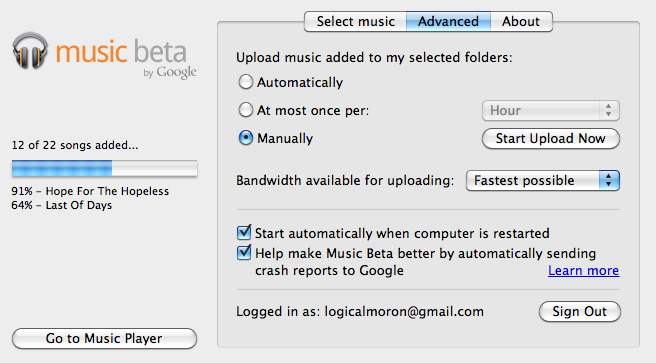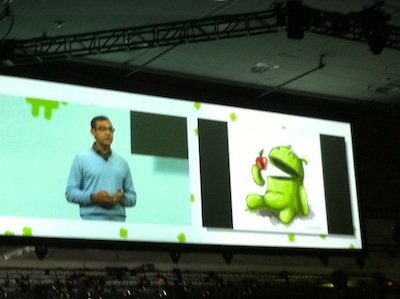 Google’s Music Beta is supposed to provide users with a way to access the music anywhere, anytime as easily as physically possible.
Google’s Music Beta is supposed to provide users with a way to access the music anywhere, anytime as easily as physically possible.
But it’s just not that easy.
I’ve spent the past few hours trying to navigate my way through Music Beta and ended up finding new frustrations at nearly every turn. Music Beta in its current form is far from what we’d expect from a Google product— it’s a web of confusing programs without a lot of instruction as to how to actually get to the music you want to hear.
The process starts with this little bugger: the Music Manager, pictured below. Once you jump through Google’s hurdles and land an invitation to Music Beta, you have to download the manager and use that program exclusively to upload music. It’s easy enough to navigate — it’ll pull songs from your iTunes library or from specific folders you select — but there isn’t a simple drag and drop option like on Dropbox (which I can also use to stream music to my mobile devices). The software cryptically shows up in system preferences. The app itself is also pretty slow when you run it the first time.

Once you upload music to Google’s remote servers, you are supposed to be able to access these files from any device — including mobile Android devices. I tried downloading the newest Music app onto an Android device to try it out myself. No dice. I was instead forced to transfer some music from my computer onto the device before I was able to access Music Beta, and even then the file transfer program didn’t work. So much for that idea.
Luckily I was still able to access the web application on a tablet and on a laptop. I played a few of the songs that I uploaded to find that the lossless quality (yes, I’m a bit of an audio snob) was, for the most part, preserved. Music Beta plays files at a max bit rate of around 320 kilobytes per second — which is a little past the threshold where untrained ears can tell the difference in music quality. But I was struck by just how ridiculously similar the whole experience feels when compared to Grooveshark, which has been around for some time. The difference is that I can access any song I want that’s available on the Internet on Grooveshark with relatively little difficulty.

There’s one spot that Google beats Grooveshark, however: Google caches music that you’ve recently listened to, along with a few playlists and albums you select. That’s supposed to keep you sated when there isn’t any access to the Internet. Grooveshark has mobile apps that also let you stream music, but it isn’t cached in plain sight and is easily reachable — and it was also pulled from Apple’s App Store. That, and Google’s Music Beta is explicitly “entirely legal,” said Hugo Barra, director of product management for Google.
Unfortunately, that means Google is missing a key part of the cloud music puzzle — the ability to re-download songs from that server somewhere out in the cloud onto other devices, removing the need to physically transfer those files. There are a lot of legal ramifications associated with re-downloading, but at this point if there is any company that should be able to iron out the details, it’s Google. And we can use a number of other applications, like Dropbox, to do the same thing — just not with mobile devices.
It should also be noted that this “caching feature” is the same mechanism that got Kongregate, an online marketplace for flash-based games, in trouble and was a factor that led to it eventually being booted off the marketplace. Sure, this is Google’s proprietary software, but it isn’t doing itself any favors by throwing its support behind a feature like this when it summarily banned an app that was literally no threat to the Android Marketplace for doing the same thing. Kongregate has since modified its app to suit Google’s demands for the Android Marketplace.
 On top of all this, Music Beta can upload files that I’ve purchased on iTunes. I’m not sure how long Apple would let something like this fly, seeing as it is pretty angsty when it comes to other devices and applications synching up with iTunes. The Palm Pre, for example, tried to pretend it was an iPhone in iTunes, and Apple just changed the software every time to block that feature.
On top of all this, Music Beta can upload files that I’ve purchased on iTunes. I’m not sure how long Apple would let something like this fly, seeing as it is pretty angsty when it comes to other devices and applications synching up with iTunes. The Palm Pre, for example, tried to pretend it was an iPhone in iTunes, and Apple just changed the software every time to block that feature.
We’ve contacted Apple for a comment on the subject but haven’t heard back from them yet.
In the grand scheme of things, these are pretty minor complaints. But taken as a whole they really ruin the experience — especially because we have come to expect very good things from Google and the rest of the smartphone manufacturing industry. The cloud music game is too high-profile of a game to flop.
You can bet that Apple will come out of the gates swinging — along with just about any other competitor. Google was pretty jovial about how it was handling its most significant competitor in the smartphone market. But you need to be able to back up your position with superior applications and devices. I personally prefer the Android experience over the iPhone, but I will happily march over to Apple’s side if they can deliver a better cloud-based music experience.
Google hasn’t flopped just yet. After all, this is a closed beta — it’s only available to U.S. users for the time being and there are plenty of kinks to work out. Still, I’m hoping that my next several hours with the service are more exciting than the catastrophe the first few were.
VentureBeat's mission is to be a digital town square for technical decision-makers to gain knowledge about transformative enterprise technology and transact. Learn More
